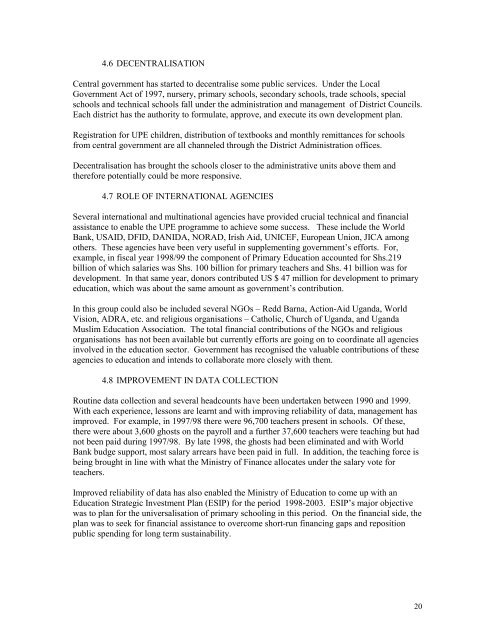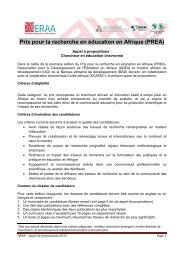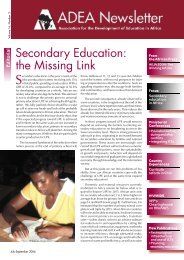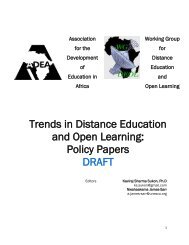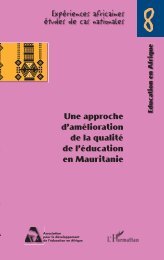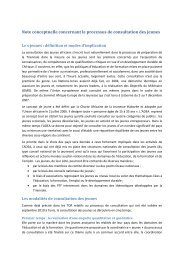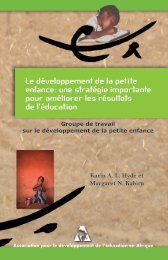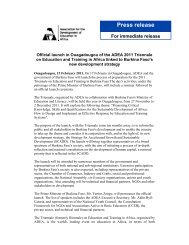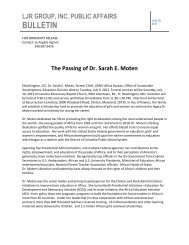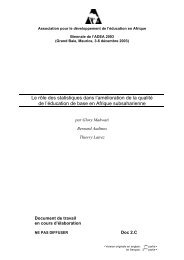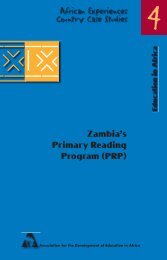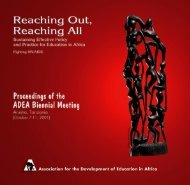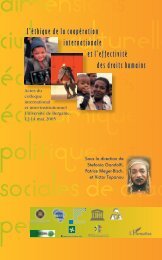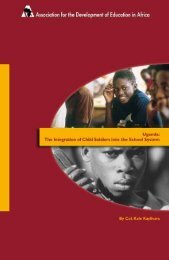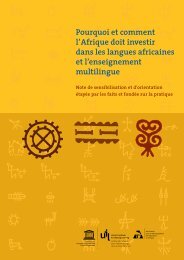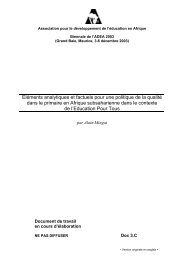the ugandan experience of universal primary education (upe) - ADEA
the ugandan experience of universal primary education (upe) - ADEA
the ugandan experience of universal primary education (upe) - ADEA
Create successful ePaper yourself
Turn your PDF publications into a flip-book with our unique Google optimized e-Paper software.
4.6 DECENTRALISATION<br />
Central government has started to decentralise some public services. Under <strong>the</strong> Local<br />
Government Act <strong>of</strong> 1997, nursery, <strong>primary</strong> schools, secondary schools, trade schools, special<br />
schools and technical schools fall under <strong>the</strong> administration and management <strong>of</strong> District Councils.<br />
Each district has <strong>the</strong> authority to formulate, approve, and execute its own development plan.<br />
Registration for UPE children, distribution <strong>of</strong> textbooks and monthly remittances for schools<br />
from central government are all channeled through <strong>the</strong> District Administration <strong>of</strong>fices.<br />
Decentralisation has brought <strong>the</strong> schools closer to <strong>the</strong> administrative units above <strong>the</strong>m and<br />
<strong>the</strong>refore potentially could be more responsive.<br />
4.7 ROLE OF INTERNATIONAL AGENCIES<br />
Several international and multinational agencies have provided crucial technical and financial<br />
assistance to enable <strong>the</strong> UPE programme to achieve some success. These include <strong>the</strong> World<br />
Bank, USAID, DFID, DANIDA, NORAD, Irish Aid, UNICEF, European Union, JICA among<br />
o<strong>the</strong>rs. These agencies have been very useful in supplementing government’s efforts. For,<br />
example, in fiscal year 1998/99 <strong>the</strong> component <strong>of</strong> Primary Education accounted for Shs.219<br />
billion <strong>of</strong> which salaries was Shs. 100 billion for <strong>primary</strong> teachers and Shs. 41 billion was for<br />
development. In that same year, donors contributed US $ 47 million for development to <strong>primary</strong><br />
<strong>education</strong>, which was about <strong>the</strong> same amount as government’s contribution.<br />
In this group could also be included several NGOs – Redd Barna, Action-Aid Uganda, World<br />
Vision, ADRA, etc. and religious organisations – Catholic, Church <strong>of</strong> Uganda, and Uganda<br />
Muslim Education Association. The total financial contributions <strong>of</strong> <strong>the</strong> NGOs and religious<br />
organisations has not been available but currently efforts are going on to coordinate all agencies<br />
involved in <strong>the</strong> <strong>education</strong> sector. Government has recognised <strong>the</strong> valuable contributions <strong>of</strong> <strong>the</strong>se<br />
agencies to <strong>education</strong> and intends to collaborate more closely with <strong>the</strong>m.<br />
4.8 IMPROVEMENT IN DATA COLLECTION<br />
Routine data collection and several headcounts have been undertaken between 1990 and 1999.<br />
With each <strong>experience</strong>, lessons are learnt and with improving reliability <strong>of</strong> data, management has<br />
improved. For example, in 1997/98 <strong>the</strong>re were 96,700 teachers present in schools. Of <strong>the</strong>se,<br />
<strong>the</strong>re were about 3,600 ghosts on <strong>the</strong> payroll and a fur<strong>the</strong>r 37,600 teachers were teaching but had<br />
not been paid during 1997/98. By late 1998, <strong>the</strong> ghosts had been eliminated and with World<br />
Bank budge support, most salary arrears have been paid in full. In addition, <strong>the</strong> teaching force is<br />
being brought in line with what <strong>the</strong> Ministry <strong>of</strong> Finance allocates under <strong>the</strong> salary vote for<br />
teachers.<br />
Improved reliability <strong>of</strong> data has also enabled <strong>the</strong> Ministry <strong>of</strong> Education to come up with an<br />
Education Strategic Investment Plan (ESIP) for <strong>the</strong> period 1998-2003. ESIP’s major objective<br />
was to plan for <strong>the</strong> <strong>universal</strong>isation <strong>of</strong> <strong>primary</strong> schooling in this period. On <strong>the</strong> financial side, <strong>the</strong><br />
plan was to seek for financial assistance to overcome short-run financing gaps and reposition<br />
public spending for long term sustainability.<br />
20


